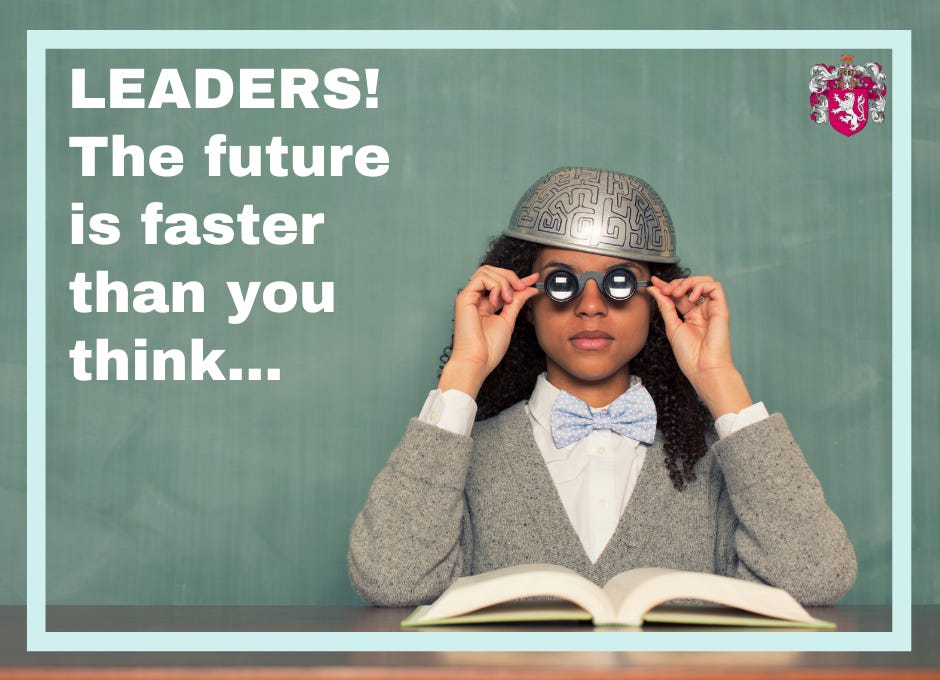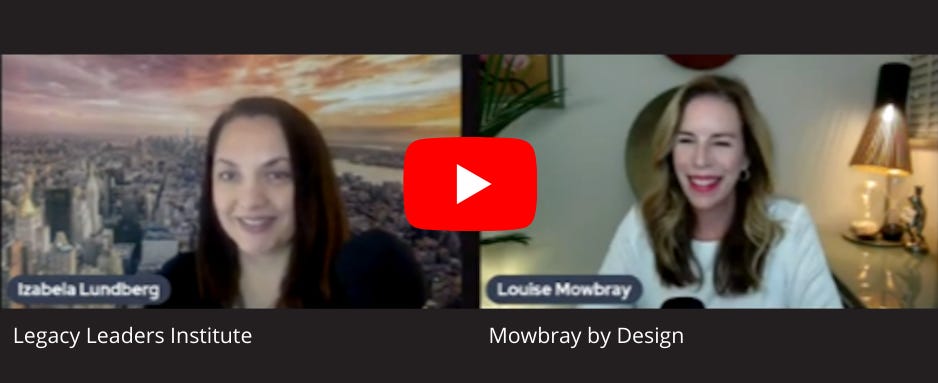Lead Into the Future Today (LIFT) is brought to you by Louise Mowbray of Mowbray by Design, the creative Conscious Leadership Consultancy. If you’re reading this and haven’t yet subscribed, you can do so here:
The soul of great leadership has always been a little mystical. Why? Because the only way to define or measure outstanding leadership is to discover why people follow one another and to measure some sort of return on this. And the return could be in any form - political power, social impact or making a profit to name a few.
So how can we extract all that we know, become better leaders and produce a better return on our efforts?
The leadership training and development industry arose out of this age-old quest. In 2020, the global market size was valued at $357.7B, which was down on 2019 ($370.3B) due to the global pandemic (TrainingIndustry.com).
That’s a lot of money, especially when you consider that most leadership development programmes fall horribly short of their desired outcomes. You can dig into the ‘why’ of this in McKinsey’s 2020 report: Maximizing behavioural change in leadership development programs.
So let’s get into this topic…
I believe that ethics will be our greatest leadership challenge yet…
Who we need to be as leaders, today and into the future is not who we needed to be three or even five years ago. Because the greatest challenge we’re all facing as we begin to imagine a post-pandemic world is balancing the two most critical ingredients of any business endeavour, that of humanity and technology.
Let’s take a broad view of this for a moment. We know that technologies including facial recognition, iris and fingerprint scanning are already in full bloom, as is the debate on how we should use them. We also have tech embedded in our clothing and our phones, screens and cars and Apple have just launched their AirTag with an anti-stalking feature. And we know that Siri, Alexa, Google and all of our social platforms know way too much about us.
Take the next step, which is closer than you might think and imagine a world where we’re now embedding nanotech in our physical bodies. It’s not a great stretch, embedded and attached medical devices have kept us alive and improved the quality of our lives for some time.
The big shift here is the boundaries between our bodies and the devices that we will wear and/or embed - and the networks that these devices will interact with will become increasingly integrated.
If we think this through, the one leadership quality we are going to need, above all else, is a well developed ethical lens. And yes, I am focusing on us as human beings rather than the changing face of our world of work because they are wholly interconnected.
Leaders will have an increasingly tough mandate…
We know that science and technology can or will be able to achieve most things going forward. I say most things as NASA has just produced oxygen on Mars (MIT News) making living on uninhabitable planets ever more possible. On a side note, if only we applied our minds and funds to our earthly challenges in the same way… However, I digress…
As we have seen with developments in Genomics over recent years (How a Chinese Scientist Broke the Rules to Create the First Gene-Edited Babies | WSJ), the latest developments will always be ten steps ahead of regulation, ethical policies and law.
Every technological or scientific breakthrough we celebrate will present us with an ethical quandary: should we do it? And who gets to decide?
Leaders in the not too distant future will have to make increasingly difficult decisions on incremental advancements in tech and how we use it. Ultimately, science and technology will challenge our concept of what it means to be human, which we have been debating a’la Singularity (Ethics of Artificial Intelligence and Robotics | Stanford) for some time.
There are three Big Q’s worth asking ourselves right now are:
What are my values, what do I value and where are the lines I won’t cross?
Where do I stand on various issues - is it really a stand or could someone/thing twist my arm for the glory of discovery or profit itself?
Am I prepared to stick my neck out and risk my current livelihood or standing to be on the right side of “should we do it”? And what is the right side?
These are what I like to call research Q’s. In other words, they don’t need an immediate answer, rather we need to become deeply curious and keep these Q’s front of mind as we go about our day-to-day lives. The answers will become clear with each practical choice we are faced with over time.
The foundation of developing an ethical lens on the world, as you lead yourself, your team and your business into the future, rests firmly on your beliefs, your mindset, how you think and ultimately, how well you know yourself.
🔎 If you’d like to know yourself better, I recommend taking the award-winning Lumina Spark Profile. Unlike most personality profiling tools, Lumina measures your three persona’s, revealing who you are under different circumstances. Learn more.
Q: So back to my original question: how can we extract all that we know to become better leaders and produce a better return on our efforts?
There are loads of leadership models out there and whatever you follow, whether it’s conscious leadership, servant leadership, integral, inclusive, transformational, empathetic or any other style, they are all right and good. They all have value and are designed to take us on a journey of self-awareness, self-knowledge and self-mastery.
So whatever leadership modality floats your boat, whatever speaks to you right now, go with that. And know there will always be a “what else and what’s next?” All human development is continuous and our discoveries across neuroscience and epigenetics are doing a great job of informing the changing face of leadership methodologies.
Future Ready Leaders
Jacob Morgan, the best-selling author, keynote speaker and futurist’s latest book The Future Leader explores the makeup of future-ready leaders.
Morgan interviewed over 140 of the world's top CEOs and surveyed nearly 14,000 people. The result is that whilst we still need the foundations of creating a vision and executing on strategy, those surveyed believe there are nine critical skills and mindsets for leading into the future:
Skills:
Coach: Leaders need to appreciate employees as individuals and develop them.
Futurist: Leaders need to consider multiple scenarios and think through new possibilities (more on this below).
Technology Teenager: Just like teenagers, leaders need to be tech-savvy and digitally fluent.
Translator: Like translators, leaders need to be master listeners and communicators.
Yoda: Leaders need to be emotionally intelligent like Yoda and develop their empathy and self-awareness.
Mindsets:
Global Citizen: The mentality of the Global Citizen means thinking globally and embracing diversity.
Servant: The mindset of service means that you practice humility and you serve all of your stakeholders.
Chef: Leaders must masterfully balance the two most essential ingredients of any business: humanity and technology.
Explorer: Future leaders need to be like explorers of old and embrace the unknown.
Let’s also talk about some major shifts in the realms of leadership development over the last few years, which are gaining momentum and are in my view, here to stay.
The first is Leadership Team Coaching: we’re shifting from coaching individual leaders to coaching leadership teams. Why? Because we need the rich diversity of everyone’s thinking, skills and experience if we are to thrive. Our world of work is way too complex and changing way too fast to work in any other way.
The second is a shift from being thought-leaders to being thought-partners. If we’ve learned anything over the last year, it’s that no one has all the answers. We need to collaborate with all of our stakeholders and find better ways forward. So rather than coming up with a new solution and presenting it as a fait accompli, we need to navigate the future together.
The third is all about purpose and impact. A vision, mission and strategy used to be enough. Today and moving into the future, we need to keep refining our purpose and measuring our impact. Conscious capitalism, conscious business, B Corps, impact economics, the circular economy (and various flavours of these) serve to give us frameworks to work with. But who do we, as leaders, need to be to drive all of this? Do you have a purpose that is greater than profit? If not, you may find yourself falling behind.
The fourth is we need to think like futurists. Have you noticed that the language of strategic foresight has crept its way into mainstream business-speak over the last year? It lived on the edges, gathering momentum and suddenly populated our everyday language in 2020. If you think about it, we are all futurists. To be human is to think about the future. If you’re planning your next holiday or dinner or what you’d like to study or your next business, you’re being a futurist.
💡 I took an accreditation course in Strategic Foresight, through The Futures School (Kedge) a few years ago and it was brilliant. It really helped to refine my thinking around all of this and so much more. If you haven’t got time for a degree, this, or something similar is a great way to get started.
Conscious & Transformational Leadership
Last, but certainly not least, last week I was honoured to be interviewed by the fabulous Izabela Lundberg, Founder, Legacy Leaders Institute. We discussed all things conscious and transformational leadership and everything in between. Essentially, two leadership geeks exploring who we need to be to lead into the emergent future. I trust you enjoy this conversation as much as we did.
Connect with Izabela on LinkedIn
So that’s me for the time being. If this has in any way inspired you to develop your leadership lens on the world, book a time with me or send me a mail and we’ll arrange a time for a conversation.
And if you know of someone else who would also benefit from reading or listening to this episode, why not share it?
Until next time, take good care of yourself.
Best, Louise














Share this post